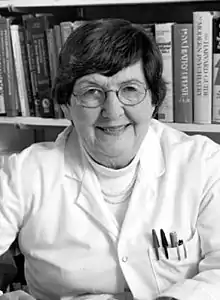Jimmie C. Holland
Jimmie Coker Holland (April 9, 1928 – December 24, 2017) was a founder of the field of psycho-oncology.[1] In 1977, she worked with two colleagues to establish a full-time psychiatric service at Memorial Sloan Kettering Cancer Center.[2] The program was one of the first of its kind in cancer treatment, and trained its psychologists to specialize in issues specific to people with cancer.[2]
Jimmie C. Holland | |
|---|---|
 | |
| Born | Jimmie Coker April 9, 1928 |
| Died | December 24, 2017 (aged 89) |
| Occupation(s) | Psychiatrist, medical researcher |
| Known for | Founder of psycho-oncology |
Biography
Born in Nevada, Texas, in 1928, Holland earned her medical degree from Baylor College of Medicine in Houston, Texas, in 1952, and received her board certification in psychiatry in 1966. She taught and practiced at the State University of New York, Buffalo, and Montefiore Hospital of Albert Einstein College of Medicine in New York City. Holland was chief of the Psychiatry Service, which she helped create, for New York's Memorial Sloan-Kettering (MSK) Cancer Center from 1977 to 1996. Holland held a named chair at MSK, the Wayne E. Chapman Chair in Psychiatric Oncology.[3] During her years at MSK, Holland created the nation's largest training and research program in psycho-oncology. In 1984, she produced for Sloan-Kettering the first syllabus on psycho-oncology and, in 1989, was senior editor of the first textbook on the subject.[1]
Holland founded the American Psychosocial Oncology Society (formerly known as the American Society of Psychosocial and Behavioral Oncology/AIDS) in 1980, and co-founded the International Psycho-Oncology Society (IPOS) in 1984. She is also credited with putting psychosocial and behavioral research on the agenda of the American Cancer Society (ACS) in the early 1980s.[1] She was a co-editor-in-chief of the journal Psycho-Oncology.[4]
The ACS awarded her its Medal of Honor for Clinical Research in 1994. She was elected a Fellow in the Institute of Medicine of the National Academy of Sciences in 1995, and received the Presidential Commendation from the American Psychiatric Association in 2000, among many other awards.[1]
Her husband, James F. Holland, was an oncologist and an important figure in the early development of cancer chemotherapy.[5] Her interest in the field of psycho-oncology arose in part from discussions with her husband about the patients he treated, and the understanding that arose from those discussions that little was known about the experiences of people with cancer and that little was being done to help people with cancer manage the experience.[2]
Holland died of complications of cardiovascular disease on December 24, 2017, at the age of 89.[6][7]
See also
Further reading
- Holland, JC (March–April 2002). "History of psycho-oncology: overcoming attitudinal and conceptual barriers". Psychosom. Med. 64 (2): 206–21. doi:10.1097/00006842-200203000-00004. PMC 482882. PMID 1191443.
References
- National Library of Medicine, Changing the Face of Medicine. Dr. Jimmie C. Holland Page accessed March 28, 2016
- Rosenthal, Elizabeth (July 20, 1997). "Scientist at Work: Jimmie Holland; Listening to the Emotional Needs of Cancer Patients". New York Times. Retrieved March 22, 2016.
- "Jimmie C. Holland, MD". Memorial Sloan Kettering Cancer Center. Archived from the original on February 10, 2016. Retrieved March 28, 2016.
- "Psycho-Oncology". Psycho-Oncology. doi:10.1002/(ISSN)1099-1611. Retrieved March 28, 2016.
- Piana, Ronald (June 10, 2015). "A tribute to James F. Holland, MD, in celebration of his 90th birthday". American Society of Clinical Oncology. Retrieved March 28, 2016.
- The ASCO Post (December 26, 2017). "Oncology World Mourns the Loss of Jimmie C. Holland, MD, Founder, Field of Psycho-Oncology". The ASCO Post. American Society of Clinical Oncologists (ASCO). Archived from the original on December 28, 2017. Retrieved December 27, 2017.
- Roberts, Sam (January 4, 2018). "Jimmie Holland, Who Cared for the Cancer Patient's Mind, Dies at 89". The New York Times.
This article incorporates text from the United States National Library of Medicine (), which is in the public domain.